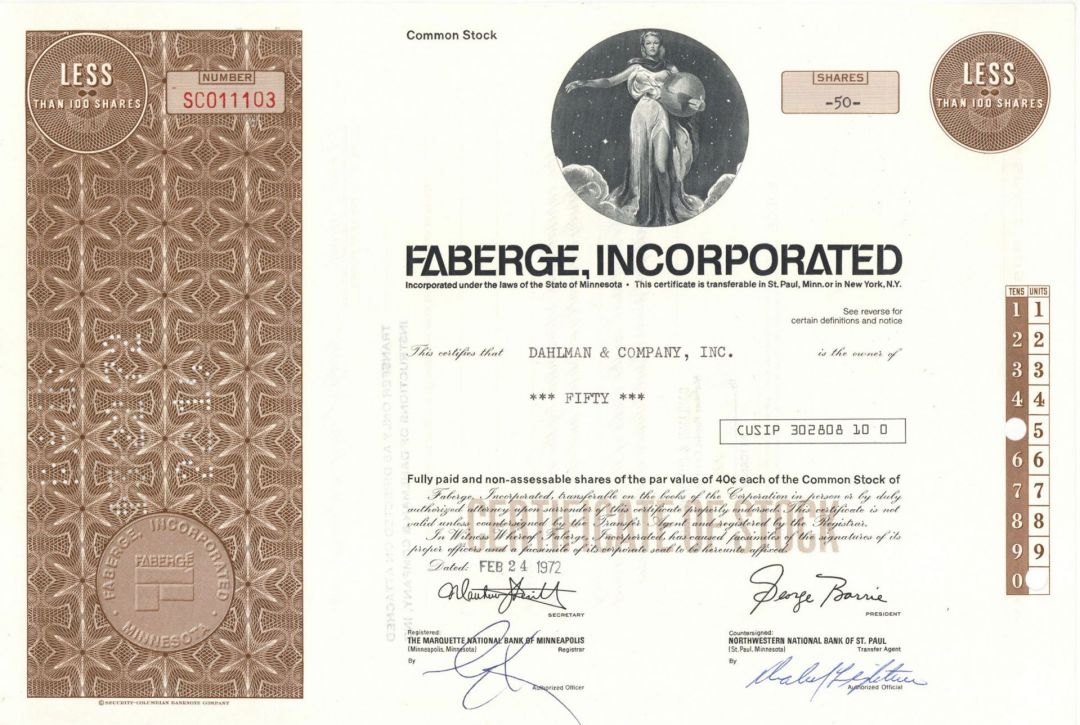Faberge, Inc. - 1970's dated Cosmetics Firm Stock Certificate
Inv# GS1113 StockNew York
Cosmetic Stock printed by Security-Columbian Banknote Company. Attractive modern vignette of female figure holding a globe with starlit sky. Available in Brown or Green. Please specify color.
The House of Fabergé was a jewellery firm founded in 1842 in Saint Petersburg, Russia, by Gustav Faberge, using the accented name Fabergé. Gustav's sons – Peter Carl and Agathon – and grandsons followed him in running the business until it was nationalised by the Bolsheviks in 1918. The firm was famous for designing elaborate jewel-encrusted Fabergé eggs for the Russian Tsars, and for a range of other work of high quality and intricate detail. In 1924, Peter Carl's sons Alexander and Eugène Fabergé opened a firm called Fabergé & Cie in Paris, France, making similar jewellery items and adding the name of the city to their firm's stamp, styling it FABERGÉ, PARIS.
In 1951, rights to the Fabergé brand name for the marketing of perfume were bought by Samuel Rubin. In 1964, Rubin sold his Fabergé Inc. company to cosmetics firm Rayette Inc., which changed its name to Rayette-Fabergé Inc. As the brand was resold more times, companies using the Fabergé name launched clothing lines, the cologne Brut (which became the best-selling cologne at the time), the perfume Babe, hair products, and also undertook film production. The brand changed hands additional times, and jewellery was eventually added back to the product lines. Next to branded Fabergé items, the world market has been continuously supplied with imitation "Fauxbergé" objects and "Fabergé-style" products. Today, the brand is owned by a company called Fabergé Limited and is used solely for jewellery items and gem stones.
Fabergé was a brand of cosmetics manufactured between 1964 and 1984 under the direction of George Barrie. In 1984, McGregor Corporation acquired Fabergé and discontinued many Fabergé products. In 2007, the trademarks, licences and rights were transferred to Fabergé Limited, in the Cayman Islands, Mark Dunhill became CEO, and it announced an intention to make Fabergé a luxury goods brand.
The American oil billionaire Armand Hammer collected many Fabergé pieces during his business ventures in communist Russia in the 1920s. In 1937, Armand Hammer’s friend Samuel Rubin, owner of the Spanish Trading Corporation which imported soap and olive oil, closed down his company because of the Spanish Civil War and established a new enterprise to manufacture perfumes and toiletries. He registered it, at Hammer’s suggestion, as Fabergé, Inc. The Fabergé family did not learn about this until after World War II ended. Unable to afford protracted and expensive litigation, in 1951 they settled out of court for US$25,000 ($250,000 today) for the Fabergé name to be used in connection with perfume. Soon, Rubin added cosmetics and toiletries under the Fabergé banner, usually sold in upscale department stores. Fabergé had a high, prestige status, similar to rivals Coty, Guerlain and Elizabeth Arden.
In 1964, Rubin sold Fabergé Inc. for $26 million to George Barrie and the cosmetics company Rayette. In 1964, Rayette changed its name to Rayette-Fabergé Inc., and, in 1971, the company name was changed back to Fabergé Inc. Fabergé launched many successful cosmetics products and hired celebrities to endorse them. In addition a media division made feature movies. Read more at https://en.wikipedia.org/wiki/House_of_Faberg%C3%A9
A stock certificate is issued by businesses, usually companies. A stock is part of the permanent finance of a business. Normally, they are never repaid, and the investor can recover his/her money only by selling to another investor. Most stocks, or also called shares, earn dividends, at the business's discretion, depending on how well it has traded. A stockholder or shareholder is a part-owner of the business that issued the stock certificates.











Ebay ID: labarre_galleries